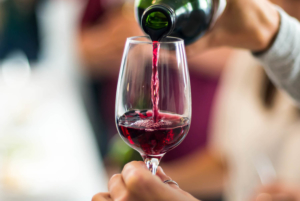Turn Down the Alcoholic Night Cap.
November 30, 2021

Alcohol is not a sleeping aid. You’d think it was though, after sleeping pills it is the most commonly used drug to help people fall asleep.
This seems to be widely misunderstood though, many individuals feel and believe that alcohol helps them fall asleep more easily and it brings them better sleep throughout the night. Both are not true.
The confusion surrounding alcohol may be due to its labeling. alcohol is classed as a sedative.
If we consider what a sedative is and what alcohol actually does you will quickly see the issue. A sedative is a drug taken for its calming or sleep-inducing effect. With alcohol, the problem is that it initially livens you up, it increases your sociability, takes away your inhibitions, and increases risk-taking behaviours.
Doesn’t sound like a sedative at all.
If we look into the effect alcohol has on the brain we can understand why it is classed as a sedative although there is an initial livening up. Alcohol firstly only sedates one part of your brain, the prefrontal cortex, the region that helps control our impulses and restrains our behaviour. With alcohol sedating this part of the brain the effect is one of loosening up, you become less controlled and more extroverted.
As the alcohol has more time in your body it will slowly sedate other areas of your brain. With this the rest of your brain becomes more sedated, you will start losing the ability to remain conscious, you’ll be easily able to slip into an unconscious state. This is not sleeping though, it is the elimination of wakefulness but it is not inducing natural sleep.
As you continue to be in this slumber you will be impacted in two ways.
Firstly alcohol fragments sleep, littering your night with regular and brief wakefulness (wakefulness you don’t even remember the next morning). Alcohol-infused sleep is therefore not continuous sleep or restorative sleep and is unknown to the person sleeping. The end result of this is next-day exhaustion caused by undetected sleep disruption.
Secondly, alcohol is a powerful suppressor of REM sleep. Anyone consuming moderate amounts of evening alcohol is depriving themselves of dream sleep. This is a major concern. REM sleep has the function of aiding in memory and cognitive functioning, without REM sleep the results will be frightening. Consequences that will force a way into waking consciousness causing disorientation, delusion, and even hallucinations.
If you are using alcohol as a nightcap you are very likely inviting sleep deprivation into your life. Even if you are giving yourself an 8 hour plus sleeping window, the drinks you are having are causing an alcohol-induced unconscious state, not natural sleep. A cycle that will cause serious negative impacts on your health and daily life.
Re-Think that alcoholic nightcap, aim to limit alcohol to only a few drinks once or twice a week.
Share This Story, Choose Your Platform!
Turn Down the Alcoholic Night Cap.
November 30, 2021

Alcohol is not a sleeping aid. You’d think it was though, after sleeping pills it is the most commonly used drug to help people fall asleep.
This seems to be widely misunderstood though, many individuals feel and believe that alcohol helps them fall asleep more easily and it brings them better sleep throughout the night. Both are not true.
The confusion surrounding alcohol may be due to its labeling. alcohol is classed as a sedative.
If we consider what a sedative is and what alcohol actually does you will quickly see the issue. A sedative is a drug taken for its calming or sleep-inducing effect. With alcohol, the problem is that it initially livens you up, it increases your sociability, takes away your inhibitions, and increases risk-taking behaviours.
Doesn’t sound like a sedative at all.
If we look into the effect alcohol has on the brain we can understand why it is classed as a sedative although there is an initial livening up. Alcohol firstly only sedates one part of your brain, the prefrontal cortex, the region that helps control our impulses and restrains our behaviour. With alcohol sedating this part of the brain the effect is one of loosening up, you become less controlled and more extroverted.
As the alcohol has more time in your body it will slowly sedate other areas of your brain. With this the rest of your brain becomes more sedated, you will start losing the ability to remain conscious, you’ll be easily able to slip into an unconscious state. This is not sleeping though, it is the elimination of wakefulness but it is not inducing natural sleep.
As you continue to be in this slumber you will be impacted in two ways.
Firstly alcohol fragments sleep, littering your night with regular and brief wakefulness (wakefulness you don’t even remember the next morning). Alcohol-infused sleep is therefore not continuous sleep or restorative sleep and is unknown to the person sleeping. The end result of this is next-day exhaustion caused by undetected sleep disruption.
Secondly, alcohol is a powerful suppressor of REM sleep. Anyone consuming moderate amounts of evening alcohol is depriving themselves of dream sleep. This is a major concern. REM sleep has the function of aiding in memory and cognitive functioning, without REM sleep the results will be frightening. Consequences that will force a way into waking consciousness causing disorientation, delusion, and even hallucinations.
If you are using alcohol as a nightcap you are very likely inviting sleep deprivation into your life. Even if you are giving yourself an 8 hour plus sleeping window, the drinks you are having are causing an alcohol-induced unconscious state, not natural sleep. A cycle that will cause serious negative impacts on your health and daily life.
Re-Think that alcoholic nightcap, aim to limit alcohol to only a few drinks once or twice a week.


